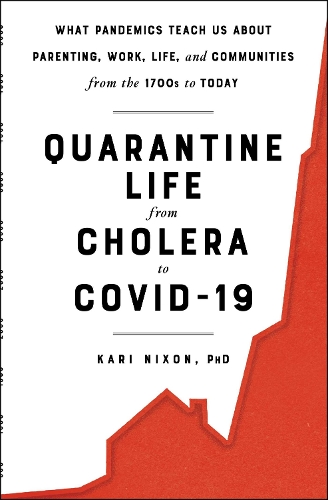
Quarantine Life from Cholera to COVID-19: What Pandemics Teach Us About Parenting, Work, Life, and Communities from the 1700s to Today
(Paperback)
Available Formats
Publishing Details
Quarantine Life from Cholera to COVID-19: What Pandemics Teach Us About Parenting, Work, Life, and Communities from the 1700s to Today
By (Author) Kari Nixon
Simon & Schuster
Simon Element
20th July 2022
United States
Classifications
General
Non Fiction
Infectious and contagious diseases
Epidemiology and Medical statistics
Physical Properties
Paperback
304
Width 140mm, Height 213mm, Spine 20mm
306g
Description
For readers of Mary Roach and Jared Diamond, an innovative look at the histories of different epidemics and what it meant for society, alongside what lessons different diseases have to teach us as society battles the novel coronavirus.
Throughout history, there have been numerous epidemics that have threatened mankind with destruction. Diseases have the ability to highlight our shared concerns across the ages, affecting every social divide from national boundaries, economic categories, racial divisions, and beyond. Whether looking at smallpox, HIV, Ebola, or COVID-19 outbreaks, we see the same conversations arising as society struggles with the all-encompassing question: What do we do now
In poignant yet relevant detail (Niki Kapsambelis, author of The Inheritance), Quarantine Life from Cholera to COVID-19 demonstrates that these conversations have always involved the same questions of individual liberties versus the common good, debates about rushing new and untested treatments, considerations of whether quarantines are effective to begin with, what to do about healthy carriers, and how to keep trade circulating when society shuts down.
This vibrant social and medical history tracks different diseases and outlines their trajectory, what they meant for society, and societal questions each disease brought up, along with practical takeaways we can apply to current and future pandemicsso we can all be better prepared for whatever life throws our way.
Reviews
" But Quarantine Life is not aimed at an academic audience. It includes disease history and the lessons of past pandemics, depictions of pandemics in literature, personal observations about the pandemic politics of the moment, and takeaway lessons from past mistakes and successes. The chief merit of the book is its readability--it is never less than engaging, as Nixon shifts between subjects and styles." --Shawn Vestal, The Spokesman-Review
"I've interviewed over three hundred scientists for my show and read nothing but science books. Never have I met someone whose incredibly distinctive work became so serendipitously relevant and important at such a specific moment in time. Kari packed a wonderful overview of three hundred years' worth of literary accounts from humans impacted by various pathogens through modern history and mixed it perfectly with modern science to give us much-needed historical perspective on the present while providing balanced views on COVID and other current diseases and, perhaps
even more important, a clearer outlook on the inevitable future. Whether you're into history, literature, or science, or just want to better understand the many frustrating and seemingly counterintuitive responses contemporary humans are having while experiencing their first pandemic . . . this is a book centuries in the making that is a must-read today." --Shane Mauss, host of the podcast Here We Are
"Lest we forget the lessons of our past, Kari Nixon reminds us--in poignant yet relevant detail--that we've been here before, and, more important, we can find our way out." --Niki Kapsambelis, author of The Inheritance: A Family on the Front Lines of the Battle Against Alzheimer's Disease
Author Bio
Kari Nixonis a professor specializing in social reactions to infectious diseases. She works at Whitworth University, where she teaches about social responses to contagion and quarantine in medical humanities and Victorian literature courses. Her work on public health has been published for lay audiences inHuffPost,YES! Magazine, and CNN. Her academic book,Kept from All Contagion: Germ Theory, Disease, and the Dilemma of Human Contact, was published by SUNY University Press, and tracks the social history of humankinds responses to disease in Victorian literature and popular culture. She regularly teaches about zombies, medical ethics, the problematic pressures on the health care system, and social justice issues for marginalized races and genders. She has edited numerous books on diseases in society.
